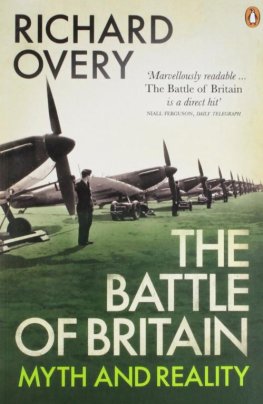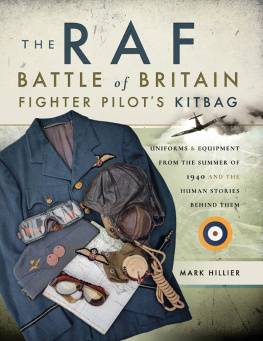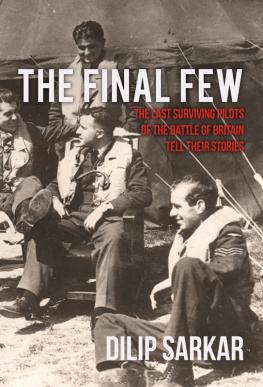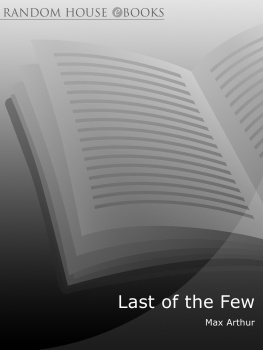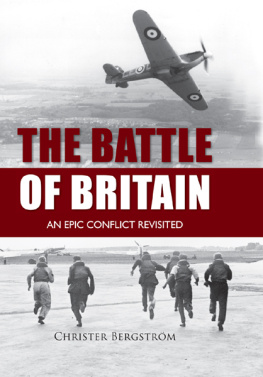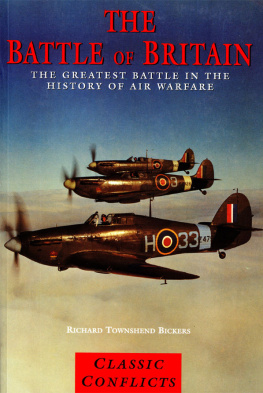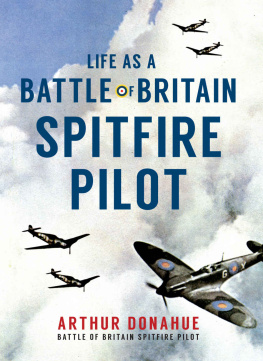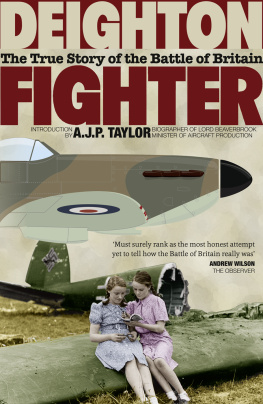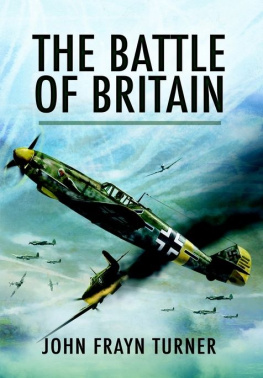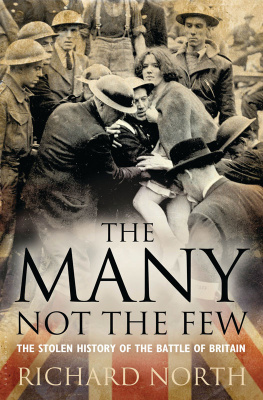THE BATTLE OF BRITAIN
HITLER'S FIRST BLOODY NOSE
Ron Powell
Group Captain RAF (Retired)
Copyright 2020 Ron Powell
All rights reserved
No part of this book may be reproduced, or stored in a retrieval system, or transmitted in any form or by any means, electronic, mechanical, photocopying, recording, or otherwise, without express written permission of the publisher.
ISBN-13: 9780957669260
Cover design by: Martin Butler
This book is dedicated to
Squadron Leaders Tony Iveson and Geoffrey Wellum
Contents
Introduction
There are so many sources of information on the Battle of Britain that youd think it would be easy to get a clear picture of what it was all about. But Ive found that not all authors agree on even the most basic aspects of the Battle, such as its causes, even its outcome, while others seem to have particular agendas to promote or axes to grind.
In producing this book in the run up to the 80 th anniversary of the Battle, Ive tried to find a way through the clutter to provide a brief, coherent and readable narrative that may inspire readers to seek more detail. Chief among my own inspirations is the short life of Pilot Officer Laurie Whitbread, a Spitfire pilot from my home town of Ludlow, shot down and killed in September 1940. He also inspired my 32-year Royal Air Force career, and my Battle of Britain novel, Wings Over Summer.
The narrative that follows is based on research for that novel and two of my talks: The Battle of Britain and Pilots of the Battle of Britain. Ive tried to keep the story of those glorious radiant boys in their Spitfires and Hurricanes front and centre. But I also want to highlight the historic importance of the Battle, something that often seems lost beneath its more romantic elements.
After all, it was Hitlers first bloody nose.
When it comes to who should take credit for the victory, there are tens of thousands, from Churchill and the other senior leaders, to the groundcrew working on the aircraft and the young women plotting the incoming raids. But ultimately it was the pilots who had to confront the enemy day after day, month after month, until theyd prevented the invasion of these islands.
In doing so, they not only left Britain free to become the springboard for Hitlers eventual overthrow, but also prevented him gaining even more territory and, perhaps more importantly, time to pursue his demonic plans for the racially impure and the many minorities he despised.
But theres more.
Freed of the need to fight on two fronts, Hitler may well have made greater initial gains in the east. However, given Russian resilience and the vast resources at their disposal, it seems highly probable that they would have triumphed in the end, driving west until the whole of Europe was under Stalins control. And who knows where he would have cast his gaze then, and at what cost?
Thanks to the young pilots of Fighter Command, we never had to find out.
So this is the story of their battle, the forces they were up against, the equipment and tactics they employed and how the combat unfolded. Although Ive included some individual stories - like those of Geoffrey Wellum and Tony Iveson, two pilots I was privileged to meet - you may think Ive mentioned too few. Its a charge I readily accept. They all deserve a mention.
But I did say I was going to be brief.
There is a bibliography acknowledging other influences and sources at the back of the book, where there is also a glossary of terms.
You can find more about me and my writing at ronpowell.co.uk.
The Arena of Battle
Hitler Strikes West
On 10 th May 1940, Winston Churchill replaced Neville Chamberlain as the British Prime Minister. Having previously moved against Denmark and Norway to the north, it was the day Adolf Hitler chose to launch his assault in the west, invading Luxembourg, Holland, Belgium and France.
Within a few days, only France remained undefeated, although large areas in the north of the country were in German hands.
Throughout May, the German advance continued, and although the British Expeditionary Force and the RAF fought a series of brave and costly rearguard actions, they were driven back ever closer to the French coast. As the month drew to a close, hundreds of thousands of British and French troops were trapped on and around the beaches of Dunkirk.
Out of sight of those awaiting rescue, the RAF fought to keep the Luftwaffe at bay as the Royal Navy and a fleet of small ships from ports all over the United Kingdom battled to bring the troops home. By 4 th June, 338,000 had been evacuated in what has become known as the miracle of Dunkirk. They left the vast bulk of their equipment behind.
When France finally surrendered on 22 nd June, only the narrow waters of the English Channel stood between the victorious German forces and the British Isles.
Churchill Names The Battle
Four days earlier, on the 125 th anniversary of Wellingtons victory at the Battle of Waterloo, Churchill had made a speech in the House of Commons in which he not only accepted the inevitability of the French defeat, but also gave a name to the battle he was sure would follow.

What General Weygand called the Battle of France is over. The Battle of Britain is about to begin. Upon this Battle depends the survival of Christian civilisation, our own British life, and the long continuity of our institutions and our Empire. The whole fury and might of the enemy must very soon be turned on us. Hitler knows that he will have to break us in this Island or lose the war. If we can stand up to him, all Europe may be free and the life of the world may move forward into broad, sunlit, uplands. But if we fail, then the whole world, including the United States, including all that we have known and cared for, will sink into the abyss of a new dark age made more sinister, and perhaps more protracted, by the lights of perverted science. Let us therefore brace ourselves to our duties, and so bear ourselves that, if the British Empire and its Commonwealth last for a thousand years, men will still say, this was their Finest Hour .
The Luftwaffe
Hitlers Plans
Having won such an overwhelming victory, why didnt Hitler just carry on and leap across the Channel?
There were several reasons. Firstly, he hoped, even believed, that Churchill would come to his senses, settling for continued mastery of the British Empire, while allowing Germany free rein on the Continent. Secondly, despite the apparent ease of victory, his forces had suffered heavy losses in the drive to the Channel coast. They needed time to recover and re-equip. And thirdly, he had no plans for an invasion of the British Isles. In the unlikely event that Britain continued to resist him, hed envisaged a naval and air blockade, not an invasion.
Some have claimed that Hitler was never really intent on invasion anyway. They say there was no Battle of Britain because the Fuhrer was already more focused on war in the east. Nonetheless, if the probes by German aircraft over the summer of 1940 had not been met and repulsed so forcefully, I suspect that his sense of purpose would have hardened. So whatever you call the activity in the skies above the British Isles that summer, German success would probably have led to an invasion.


